 |
|---|
|
|
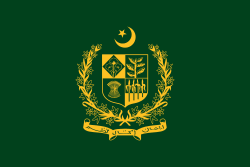
The prime minister of Pakistan ( Urdu: وزير اعظم, romanized: Wazīr ē Aʿẓam, lit. ' Grand Vizier', Urdu pronunciation: [ʋəˈziːɾˌeː ˈɑː.zəm]) is the popularly elected politician who is the chief executive of the Government of Pakistan. [1] The prime minister is vested with the responsibility of running the administration through his appointed federal cabinet, formulating national policies to ensure the safeguard of the interests of the nation and its people through the Council of Common Interests as well as making the decision to call nationwide general elections for the bicameral Parliament of Pakistan. [2] [3] [4]
Since 1947, Pakistan has had eighteen prime ministers, aside from the appointed caretaker prime ministers who were only mandated to oversee the system until the election process was finished. In Pakistan's parliamentary system, the prime minister is sworn in by the president and usually is the chairman or the president of the party or coalition that has a majority in the National Assembly– the lower house of Pakistan Parliament.
After the partition of British India on the midnight of 14/15 August 1947, Pakistan followed the British system by creating the post of prime minister based at the Prime Minister's Secretariat. [3] [4] The then governor-general of Pakistan, Muhammad Ali Jinnah, took advice from the Founding Fathers of the nation and appointed Liaquat Ali Khan to establish and lead his administration on 15 August 1947. [5] Before the presidential system in 1960, seven prime ministers had served between 1947 until martial law in 1958. In 1971, the office was again revived but ceased to exist shortly. [6] [7] Executive powers and authority was given to the prime minister when the full set of the Constitution of Pakistan was promulgated in 1973 but the post was ceased from its effective operations after another martial law in 1977. [8] [9] After the general elections held in 1985, the office came to its existence. [6] Between 1988 and 1999, the office was held by Benazir Bhutto of the PPP and Nawaz Sharif of PML(N), each holding the office for two non-consecutive terms between 1988 and 1999: Bhutto during 1988–90 and 1993–96; [10] and Sharif during 1990–93 and 1997–99. [11] [12]
After the general elections held in 2002, Zafarullah Khan Jamali was invited to form his administration as its prime minister. [13] After the Supreme Court of Pakistan's ruling to disqualify Prime Minister Yousaf Raza Gillani in 2012, the business of his administration was looked after by Raja Pervez Ashraf until the caretaker administration was setup under Mir Hazar Khan Khoso. [14] [15] [3] [4]
Nurul Amin of the Muslim League had the shortest term, at 13 days. Yousaf Raza Gilani of PPP had the longest consecutive term of 4 years and 86 days. At approximately 9 years and 215 days in total, Nawaz Sharif of PML (N) has been the longest-serving prime minister for a non-consecutive term. [3] [16] Sharif was re-elected for a third non-consecutive term on 5 June 2013, which is a record in the history of Pakistan. [17] [18] No prime minister of Pakistan has yet served their full five year term. [19]
Key
| Party name | |
|---|---|
| Muslim League / Pakistan Muslim League | |
| Awami League | |
| Republican Party | |
| Peoples Party | |
| National Peoples Party | |
| Muslim League (N) | |
| Muslim League (Q) | |
| Tehreek-e-Insaf | |
| Independent | |
| Interim leader | |
| Armed Forces / Martial Law Administrator | |
| Caretaker | |
Prime ministers
| No. | Portrait | Name | Took office | Left office | Tenure | Elections | Political party (Alliance) |
Note(s) | Government | |||
|---|---|---|---|---|---|---|---|---|---|---|---|---|
| National Assembly | Coalition [a] | |||||||||||
| 1 |
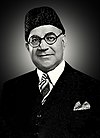
|
Liaquat Ali Khan
نوابزادہ لیاقت علی خان |
14 August 1947 | 16 October 1951 X | 4 years, 63 days | – | Muslim League | Following advice given by the Founding Fathers of the nation, Governor-General Muhammad Ali Jinnah appointed and invited the Finance Minister Liaquat Ali Khan to set up and run his administration in 1947. He was assassinated in 1951, and Khawaja Nazimuddin took the office. [5] [20] | 1st | — | ||
| 2 |
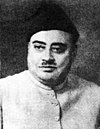
|
Sir Khawaja Nazimuddin
خواجہ ناظم الدین |
17 October 1951 | 17 April 1953 | 1 year, 182 days | – | Muslim League | Nazimuddin became Prime Minister of Pakistan after the assassination of Liaquat Ali Khan in 1951. [20] He left the office when Governor-General Malik Ghulam Muhammad dissolved his government in 1953. [3] | — | |||
| 3 |

|
Mohammad Ali Bogra
محمد علی بوگرہ |
17 April 1953 | 12 August 1955 | 2 years, 117 days | — | Muslim League | A diplomat and relatively unknown personality to Pakistani politics, Bogra established the Ministry of Talents but his administration was dismissed in 1955 by the Governor-General after the legislative elections in 1954. [3] | 2nd | — | ||
| 4 |

|
Chaudhry Mohammad Ali
چوہدری محمد علی |
12 August 1955 | 12 September 1956 | 1 year, 31 days | — | Muslim League | A first appointment from the coalition of Muslim League, Awami League and the Republican Party, he was removed by his own party following the successful vote of no-confidence movement. [3] | ML • AL • RP | |||
| 5 |

|
Huseyn Shaheed Suhrawardy
حسین شہید سہروردی |
12 September 1956 | 17 October 1957 | 1 year, 35 days | — | Awami League | Popular for his wit in law, Suhrwardy resigned due to the loss of control over his party and support from the coalition partners in his administration. [3] | — | |||
| 6 |

|
Ibrahim Ismail Chundrigar
ابراہیم اسماعیل چندریگر |
17 October 1957 | 11 December 1957 | 55 days | — | Muslim League | Third shortest-tenured Prime Minister, Chundrigar established his administration but was removed a mere 55 days into his term amid a vote of no-confidence movement led by majority votes of the Republican Party and Awami League. [3] | ML • KSP • NIP | |||
| 7 |
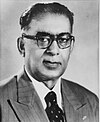
|
Sir Feroze Khan Noon
فیروز خان نون |
16 December 1957 | 7 October 1958 | 295 days | — | Republican Party | A lawyer, Sir Feroze Khan's administration collapsed after his party's own President Iskander Mirza enforced martial law in 1958 in a view of extending his term of office [21] [22] | — | |||
| — | Office vacant: Ayub Khan and Yahya Khan served as Chief Martial Law Administrator in the interim period. | |||||||||||
| 8 |

|
Nurul Amin
نور الامین |
7 December 1971 | 20 December 1971 | 13 days | 1970 | Pakistan Muslim League | Shortest-tenured Prime Minister. After the general elections in 1971, Amin was invited to be appointed as Prime Minister under Yahya administration; he was also the first and the only Vice President of Pakistan from 1970 to 1972, leading Pakistan in the Indo-Pakistani War of 1971. [3] | 5th | — | ||
| — | Office vacant: Zulfikar Ali Bhutto served as Emergency President in the interim period. | |||||||||||
| 9 |

|
Zulfikar Ali Bhutto
ذولفقار علی بھٹو |
14 August 1973 | 5 July 1977 | 3 years, 325 days | 1977 | Pakistan Peoples Party | Bhutto resigned as president to become the empowered Prime Minister after the Constitution was repromulgated, which established a parliamentary system of government. He was deposed in the martial law in 1977 by his appointed army chief, General Zia, in July 1977. [9] [23] | 6th | — | ||
| — | Office vacant: Zia-ul-Haq served as Chief Martial Law Administrator in the interim period. | |||||||||||
| 10 |

|
Muhammad Khan Junejo
محمد خان جنیجو |
24 March 1985 | 29 May 1988 | 3 years, 66 days | 1985 | Independent | Junejo was elected as the tenth Prime Minister of Pakistan in non-party based elections in 1985, therefore he was elected on an Independent ticket but he served the Pakistan Muslim League while before entering in office and during office. He was dismissed by the president as per the Eighth Amendment to the Constitution. [3] | 7th | — | ||
| — | Office vacant: Zia-ul-Haq served as Chief Martial Law Administrator in the interim period. | |||||||||||
| 11 |

|
Benazir Bhutto
بے نظیر بھٹو |
2 December 1988 | 6 August 1990 | 1 year, 247 days | 1988 | Pakistan Peoples Party | Bhutto became the first woman in Pakistan to head a major political party, in 1982. Six years later, she became the first woman elected to lead a Muslim state. [10] [24] President Ghulam Ishaq Khan dissolved her government using article 58-2b of Constitution. | 8th | — | ||
| (C) | Office vacant: Ghulam Mustafa Jatoi served as caretaker prime minister in the interim period. | |||||||||||
| 12 |

|
Nawaz Sharif
میاں محمد نواز شریف |
6 November 1990 | 18 July 1993 | 2 years, 254 days | 1990 | Islami Jamhoori Ittehad | Sharif was elected as the 12th Prime Minister of Pakistan on 1 November 1990. [25] President Ghulam Ishaq Khan dissolved his government in April 1993, which was later on reinstated by the Supreme Court of Pakistan. [11] Sharif survived a serious constitutional crisis when President Khan attempted to dismiss him under article 58-2b, in April 1993, but he successfully challenged the decision in the Supreme Court. [11] Sharif resigned from the post negotiating a settlement that resulted in the removal of President as well, in July 1993. [26] | 9th | PML-N • JI • NPP • NeM • MJAH | ||
| (C) | Office vacant: Moeenuddin Ahmad Qureshi served as caretaker prime minister in the interim period. | |||||||||||
| 13 |

|
Benazir Bhutto
بے نظیر بھٹو |
19 October 1993 | 5 November 1996 | 3 years, 17 days | 1993 | Pakistan Peoples Party | Bhutto was re-elected for a second term, in 1993. She survived an attempted coup d'état in 1995. Bhutto's government was dismissed by president Farooq Leghari in November 1996. [27] [28] | 10th | — | ||
| (C) | Office vacant: Malik Meraj Khalid served as caretaker prime minister in the interim period. | |||||||||||
| 14 |

|
Nawaz Sharif
میاں محمد نواز شریف |
17 February 1997 | 12 October 1999 | 2 years, 237 days | 1997 | Pakistan Muslim League (N) | Sharif was re-elected as Prime Minister, with an exclusive mandate from all over Pakistan for a non-consecutive second term, in February 1997. [12] [29] His government was deposed by General Pervez Musharraf in October 1999, and martial law was imposed in the entire country. [16] [30] | 11th | — | ||
| — | Office vacant: Pervez Musharraf served as Chief Executive in the interim period. | |||||||||||
| 15 |

|
Mir Zafarullah Khan Jamali
میر ظفر اللہ خان جمالی |
23 November 2002 | 26 June 2004 | 1 year, 216 days | 2002 | Pakistan Muslim League (Q) | Jamali was elected as the Prime Minister of Pakistan in November 2002. He continued the foreign and economic policies of Pervez Musharraf but could not complete his term and resigned from the post in June 2004. [13] | 12th | PML-Q • PPPP • MQM • MMA [31] | ||
| 16 |
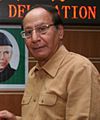
|
Chaudhry Shujaat Hussain
چوہدری شجاعت حسین |
30 June 2004 | 23 August 2004 | 54 days | — | Pakistan Muslim League (Q) | Second shortest-tenured Prime Minister. He was elected by the Parliament and served a 54-day period before Shaukat Aziz replaced him. [32] | ||||
| 17 |

|
Shaukat Aziz
شوکت عزیز |
28 August 2004 | 15 November 2007 | 3 years, 79 days | — | Pakistan Muslim League (Q) | Aziz took the office of Prime Minister of Pakistan in August 2004. He left the office at the end of the parliamentary term, in November 2007, and became the first Prime Minister of Pakistan who left the seat after completion of parliamentary term. [33] | ||||
| (C) | Office vacant: Muhammad Mian Soomro served as caretaker prime minister in the interim period. | |||||||||||
| 18 |

|
Yousaf Raza Gillani
سید یوسف رضا گیلانی |
25 March 2008 | 19 June 2012 | 4 years, 86 days | 2008 | Pakistan Peoples Party | Gillani was elected as Prime Minister in March 2008. He was disqualified from his seat in the parliament in April 2012 by the Supreme Court for contempt of court. [34] | 13th | PPP • PML-N • JUI(F) • MQM • ANP • PML-F [b] | ||
| 19 |

|
Raja Pervaiz Ashraf
راجا پرویز اشرف |
22 June 2012 | 24 March 2013 | 275 days | – | Pakistan Peoples Party | Ashraf assumed the post of Prime Minister in June 2012, after Yousaf Raza Gillani was disqualified over contempt of court charges. [14] | PPP • PML-Q • JUI(F) • MQM • ANP • PML-F | |||
| (C) | Office vacant: Mir Hazar Khan Khoso served as caretaker prime minister in the interim period. | |||||||||||
| 20 |

|
Nawaz Sharif
میاں محمد نواز شریف |
5 June 2013 | 28 July 2017 | 4 years, 53 days | 2013 | Pakistan Muslim League (N) | On 5 June 2013, Sharif took office for a third non-consecutive term after winning 182/342 seats with clear majority. [17] [18] He was disqualified on 28 July 2017 by the Supreme Court of Pakistan as a result of the Panama Papers case. [35] | 14th | PML-N • NPP • PML-F | ||
| 21 |

|
Shahid Khaqan Abbasi
شاہد خاقان عباسی |
1 August 2017 | 31 May 2018 | 303 days | — | Pakistan Muslim League (N) | Parliament elected Shahid Khaqan Abbasi as the Prime Minister after the impeachment of Nawaz Sharif. His term expired on 31 May 2018 alongside the dissolution of the National Assembly to facilitate a caretaker government in place until the 25 July general election. [36] | ||||
| (C) | Office vacant: Nasirul Mulk served as caretaker prime minister in the interim period. | |||||||||||
| 22 |

|
Imran Khan
عمران خان |
18 August 2018 | 10 April 2022 | 3 years, 235 days | 2018 | Pakistan Tehreek-e-Insaf | General elections were held on 25 July 2018, which resulted in the Pakistan Tehreek-e-Insaf winning 156 out of 342 seats. making a coalition government of 177 members including PTI, MQM, BAP and others. On 18 August, he was elected as Prime Minister of Pakistan. On 10 April 2022, a no-confidence vote was conducted and he was ousted from office. | 15th | PTI • PML-Q • GDA • MQM-P • BAP • AML • JWP | ||
| 23 |

|
Shehbaz Sharif
میاں محمد شہباز شریف |
11 April 2022 | 14 August 2023 | 1 year, 125 days | — | Pakistan Muslim League (N) | Shahbaz Sharif was elected Prime Minister of Pakistan after the successful no-confidence motion against Imran Khan. His nomination was supported by all joint opposition parties who voted to remove the previous prime minister from office, while the recently ousted government party boycotted the elections. | PML-N • PPP • MMA • MQM-P • BNP-M • BAP • PML-Q • ANP • JWP | |||
| (C) | Office vacant: Anwar-ul-Haq Kakar served as caretaker prime minister in the interim period. | |||||||||||
| 24 |

|
Shehbaz Sharif
میاں محمد شہباز شریف |
4 March 2024 | Incumbent | 44 days | 2024 | Pakistan Muslim League (N) | Highly controversial general elections were held on 8 February 2024. The elections were contested for rigging, and Shehbaz Sharif was again elected as prime minister with the support of the MQM-P, BAP, PMLQ, IPP, NP and PMLZ, as well as confidence and supply from Pakistan Peoples Party. | 16th | PML-N • IPP • MQM-P • NP • PML-Q • BAP • PML-Z • PPP | ||
Timeline

Caretakers
Notes
- ^ This includes both Members of Government as well as Confidence and supply
- ^ The PML-N was part of the coalition at first but almost immediately left.
External links
- "Prime Ministers". National Assembly of Pakistan. Retrieved 1 July 2012.
- "Pakistan". Encyclopædia Britannica. Retrieved 1 July 2012.
- ^ Article 153(2a)-153(2c) Archived 27 April 2015 at the Wayback Machine in Chapter 3: Special Provisions, Part V: Relations between Federation and Provinces in the Constitution of Pakistan.
- ^ "Prime minister". BBC News. 16 October 2008. Retrieved 8 September 2012.
- ^ a b c d e f g h i j k Tasleem, Nauman (27 June 2004). "20 prime ministers since independence". Daily Times. Archived from the original on 2 October 2013. Retrieved 9 September 2012.
- ^ a b c "Prime ministers". World Statesmen. Archived from the original on 4 March 2012. Retrieved 9 September 2012.
- ^ a b Mughal, M Yakub. "Special Edition (Liaqat Ali Khan)". The News International. Daily Jang. Archived from the original on 21 January 2012. Retrieved 8 September 2012.
- ^ a b "Parliamentary history". National Assembly of Pakistan. Archived from the original on 26 December 2018. Retrieved 20 October 2012.
- ^ Nagendra Kr. Singh (2003). Encyclopaedia of Bangladesh. Anmol Publications Pvt. Ltd. pp. 9–10. ISBN 978-81-261-1390-3.
- ^ "The constitution of the islamic republic of pakistan" (PDF). National Assembly of Pakistan. Archived (PDF) from the original on 20 September 2018. Retrieved 4 July 2012.
- ^ a b Pakistan: Zia and After. Abhinav Publications. 1989. pp. 20–35. ISBN 978-81-7017-253-6. Archived from the original on 26 October 2021. Retrieved 28 October 2012.
- ^ a b "Obituary: Benazir Bhutto". BBC News. 27 December 2007. Archived from the original on 26 December 2018. Retrieved 20 October 2012.
- ^ a b c "Profile: Nawaz Sharif". BBC News. 11 December 2000. Archived from the original on 26 December 2018. Retrieved 20 October 2012.
- ^ a b Akbar, M.K (January 1998). "Pakistan under Nawaz Sharif". Pakistan Today. New Delhi, India: Mittal Publications. p. 230. ISBN 81-7099-700-3. Archived from the original on 26 May 2013. Retrieved 8 September 2012.
- ^ a b "Profile: Zafarullah Khan Jamali". BBC News. 26 June 2004. Archived from the original on 26 December 2018. Retrieved 21 October 2012.
- ^ a b Rebecca Santana; Chris Brummitt; Zarar Khan (22 June 2012). "Raja Pervaiz Ashraf Is Pakistan's New Prime Minister". The Huffington Post. Archived from the original on 3 August 2012. Retrieved 8 September 2012.
- ^ "Yousuf Raza Gilani is sent packing". Dawn. Herald. 19 June 2012. Archived from the original on 17 May 2013. Retrieved 8 September 2012.
- ^ a b "World: South Asia: Pakistan army seizes power". BBC News. 12 October 1999. Archived from the original on 26 December 2018. Retrieved 7 October 2012.
- ^ a b "Nawaz Sharif calls for an end to US drone strikes". BBC News. 5 June 2013. Archived from the original on 24 December 2013. Retrieved 6 June 2013.
- ^ a b Nangiana, Umer (6 June 2013). "Unprecedented return: He is back". The Express Tribune. Agence France-Presse (AFP). Archived from the original on 26 December 2018. Retrieved 6 June 2013.
- ^ "No Pakistani prime minister has completed a full term in office". www.aljazeera.com. Archived from the original on 10 April 2022. Retrieved 10 April 2022.
- ^ a b "Death anniversary of Khawaja Nazimuddin". Radio Pakistan. 22 October 2012. Archived from the original on 29 October 2012. Retrieved 4 July 2012.
- ^ Nagendra Kr. Singh (2003). Encyclopaedia of Bangladesh. Anmol Publications Pvt. Ltd. pp. 9–10. ISBN 978-81-261-1390-3.
- ^ "Ouster of President Iskander Mirza". Story of Pakistan. 1 June 2003. Archived from the original on 9 January 2022. Retrieved 1 August 2017.
- ^ Ali, Hasan (19 August 2008). "4 military dictators among 14 heads of state under Officers' Club of Revolutionary Armed Forces". Daily Times. Archived from the original on 16 April 2013. Retrieved 16 January 2013.
- ^ Muhammad Najeeb in Rawalpindi & Hasan Zaidi in Karachi (28 December 2007). "Benazir Bhutto: Daughter of Tragedy". India Today. Archived from the original on 26 December 2018. Retrieved 20 October 2012.
-
^ John, Wilson; Vikram Sood and Akmal Hussain (2009) (2009).
Pakistan's economy in historical perspective: The Growth, Power and Poverty.
New Delhi and
Washington, D.C.: Dorling Kindersly (Pvt) limited, India and the Library of Congress. p. 220.
ISBN
978-81-317-2504-7.
Archived from the original on 26 October 2021. Retrieved 27 October 2012.
{{ cite book}}:|work=ignored ( help)CS1 maint: location missing publisher ( link) CS1 maint: multiple names: authors list ( link) CS1 maint: numeric names: authors list ( link) - ^ Dutt, Sanjay (2009). "1993 Elections". Inside Pakistan: 52 years oulook. New Delhi: A.P.H. Publishing Corporation. p. 267. ISBN 978-81-7648-157-1. Archived from the original on 26 December 2018. Retrieved 27 October 2012.
- ^ Ranjha, Khalid (1 June 1995). "Altaf accuses Benazir of 'racism'". DawnWireService. Archived from the original on 26 December 2018. Retrieved 20 October 2012.
- ^ Burns, John F (5 November 1996). "Pakistan's Premier Bhutto is put under house arrest". The New York Times. Archived from the original on 18 February 2011. Retrieved 5 March 2011.
- ^ Hassan, Syed Shoaib (12 March 2009). "Profile: Nawaz Sharif". BBC News. Archived from the original on 6 January 2019. Retrieved 27 October 2012.
- ^ Dugger, Celia W. (14 October 1999). "Pakistan Calm After Coup; Leading General Gives No Clue About How He Will Rule". The New York Times. Archived from the original on 11 May 2013. Retrieved 27 October 2012.
- ^ "Pakistan Prime Minister Wins Parliamentary Vote of Confidence - New York Times". web.archive.org. 5 March 2014. Retrieved 3 April 2024.
- ^ Qaisar, Rana (29 June 2004). "Chaudhry Shujaat set to become 19th PM". Daily Times. Archived from the original on 21 May 2005. Retrieved 21 October 2012.
- ^ "Soomro takes oath as Pakistan's caretaker PM". Xinhua News Agency. 16 November 2007. Archived from the original on 6 January 2019. Retrieved 21 October 2012.
- ^ Khan, Iftikhar A. (19 June 2012). "Yousuf Raza Gilani is sent packing". Xinhua News Agency. Archived from the original on 17 May 2013. Retrieved 21 October 2012.
- ^ Bhatti, Haseeb (28 July 2017). "Nawaz Sharif steps down as PM after SC's disqualification verdict". Dawn. Archived from the original on 26 December 2018. Retrieved 27 October 2017.
- ^ Zahra-Malik, Mehreen (29 July 2017). "Ousted Pakistan Leader Passes Baton to Brother, Shehbaz Sharif". The New York Times. Asia-Pacific. Archived from the original on 28 October 2021. Retrieved 1 August 2017.


